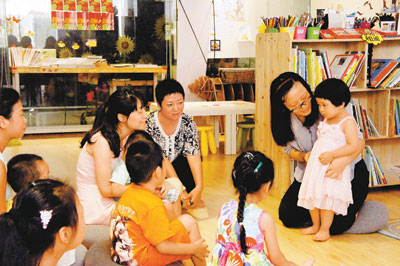
Wang Yuanyuan
cheekywang@hotmail.com
AFTER working in media for more than 10 years, Fiona Mo decided to seek a new dream: promoting a new style of early childhood education to young children and parents in a relaxing and joyful reading environment.
“Many Chinese people don’t know what new-style picture books are or how to use them in early childhood education. I want to do something to let more people know about them and help more children gain interest in reading at a young age,” Mo, a 41-year-old native of the Xinjiang Uygur Autonomous Region, told Shenzhen Daily recently.
In many Chinese people’s opinions, picture books are more like comic books with stories and pictures.
“That’s not what we are promoting. There are many new-style picture books, normally written and drawn by overseas authors. These books use vivid colors and special printings, demonstrating deep meanings through very simple words and pictures. They are even suitable for adults, too,” Mo said.
Promoting reading
Mo first thought of her dream about five years ago.
“I wanted to do something to promote reading, which I think is very important for a person’s life and career. I first wanted to open a children’s bookstore, but that idea was criticized by many of my friends. Eventually, I decided to build a platform to share advanced education concepts with parents and teach them how to build close family reading habits with their children,” she said.
Picture-book centers like Mo’s are very common in European countries, the United States and Taiwan.
“For example, there are many community centers for children to read these books. They also have teachers to help them understand the books and read the books together with parents,” she said.
“What I am trying to do is to let reading become a child’s instinct, to let them fall in love with reading. Because I think that reading is a very good growing process and can help you learn about others’ experiences conveniently.”
Mo said having a special space for that process is very important. “People, particularly children, can read books alone at home. But it’s fun to read together with other people sharing the same interests. That’s why we need such a space to share and communicate via reading,” she said.
Delivering an
education concept
Besides reading activities, Mo also organizes some special courses for children.
“My courses are quite different from those at other training centers. Everything learned from me is a ‘useless’ thing that won’t help in tests for different grades or levels,” Mo joked.
Mo said Chinese children are too busy, often with endless piano or painting lessons, for example.
“Many parents want their children to learn something useful and ignore the importance of some ‘useless’ things. However, sometimes, these ‘useless’ things can help build a child into a better and happier person,” she said.
Mo took drama training as an example.
“There are very few drama training centers in China, because it’s not as useful as dancing or musical instruments. However, drama training, in my opinion, is very useful for forming a child’s character, such as teamwork skills, communication, courage, understanding and speech. These are very important not only for a child’s character but also for his or her future career and human relationships,” Mo said. “However, because it is not something that can receive a skill-level certificate, few Chinese parents will let children do this.”
Mo said reading together as a family is important, too. Unlike teachers at many early education centers, Mo does not want her young students to come to her center with their grandparents.
“Many parents say they are too busy to take their children to these places, but that’s not what we approve in early education,” she said.
China has a long history of grandparents helping raise children, but there can be problems with that dynamic, even with the nicest grandparents.
“Research shows that parents are the most effective people for passing concepts and ideas on to children. A father’s participation can be more effective than the mother’s. However, many Chinese children lack interaction with their fathers, so I want to deliver a concept through activities to help raise parents’ awareness of accompanying their children,” she said.
About picture books
New-style picture books are becoming more and more popular in China, particularly among young people.
“In the past, most of these books were written by overseas authors, but there has been a growing number of good books written by young Chinese authors in recent years,” Mo said. “For example, there was a series of picture books about life, culture and traditions in old Beijing. It was very beautiful and creative, and a great way to teach both children and adults about our Chinese culture.”
However, Mo said the development of Chinese picture books remains at a basic level, with fewer categories, painting styles and creativity than can be found overseas.
“Overseas picture books are very creative, and use the simplest methods to tell complicated stories. They put a lot of thought into how to tell the story in the simplest way,” she said. “This is something that many Chinese authors lack.”
|

